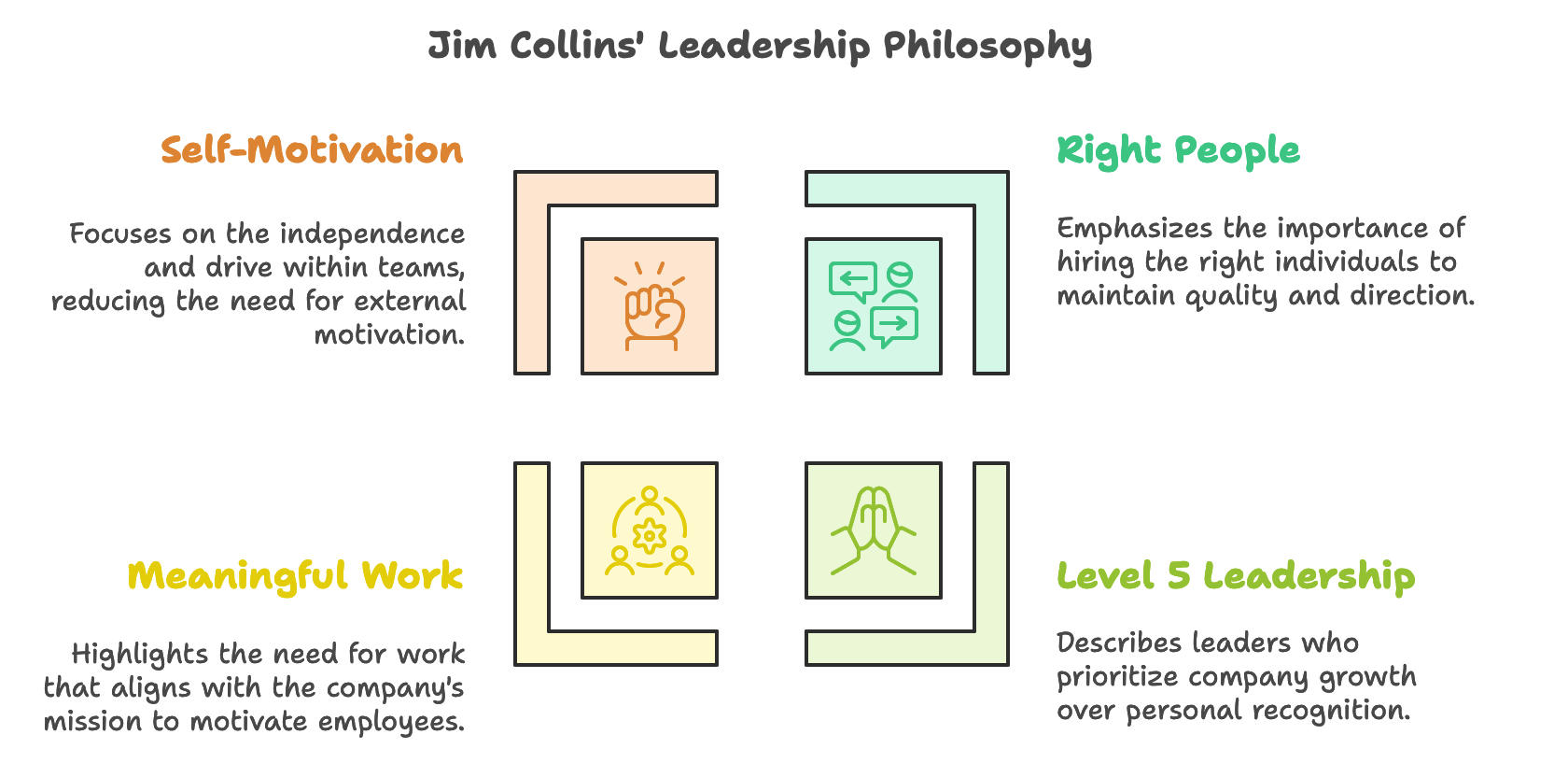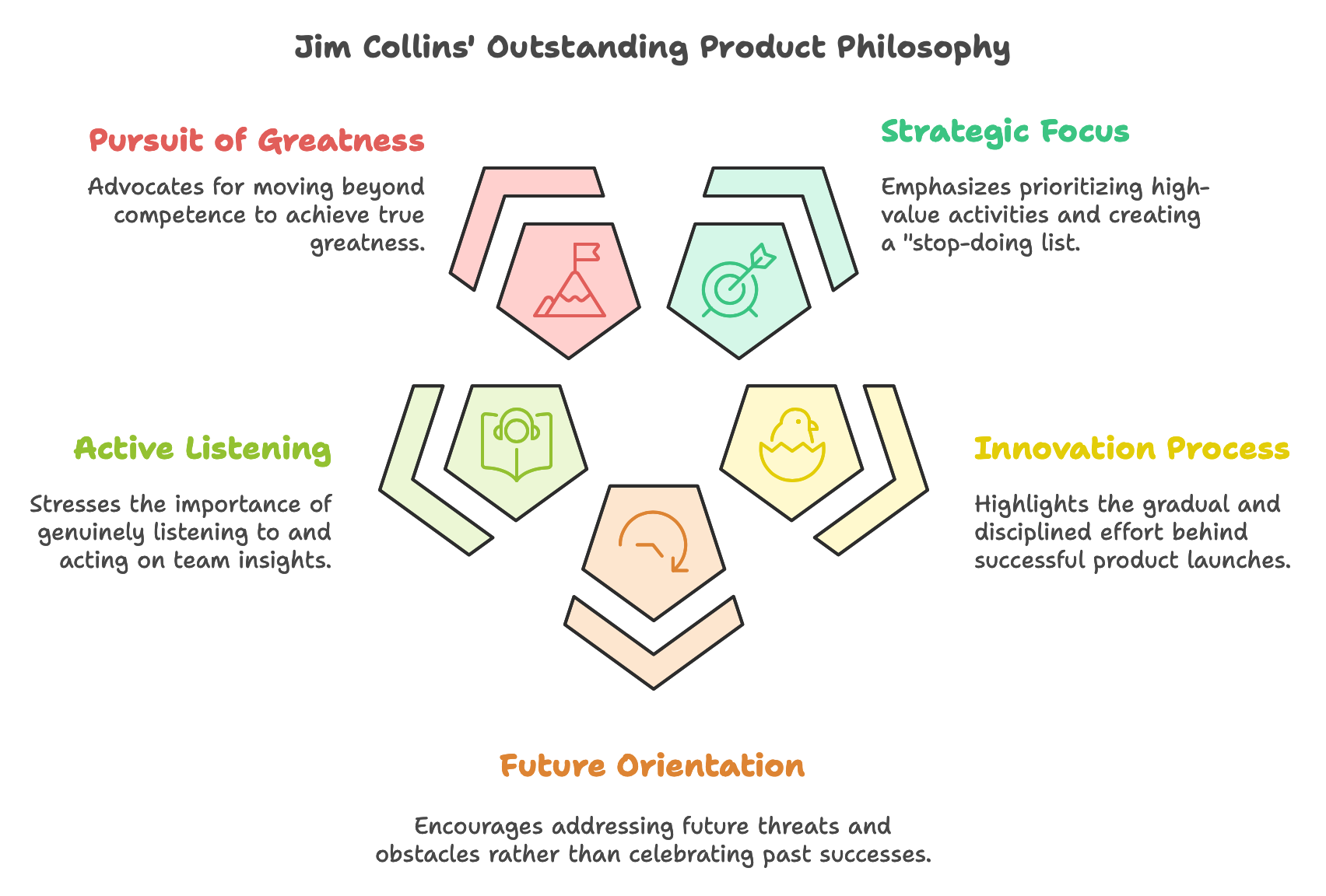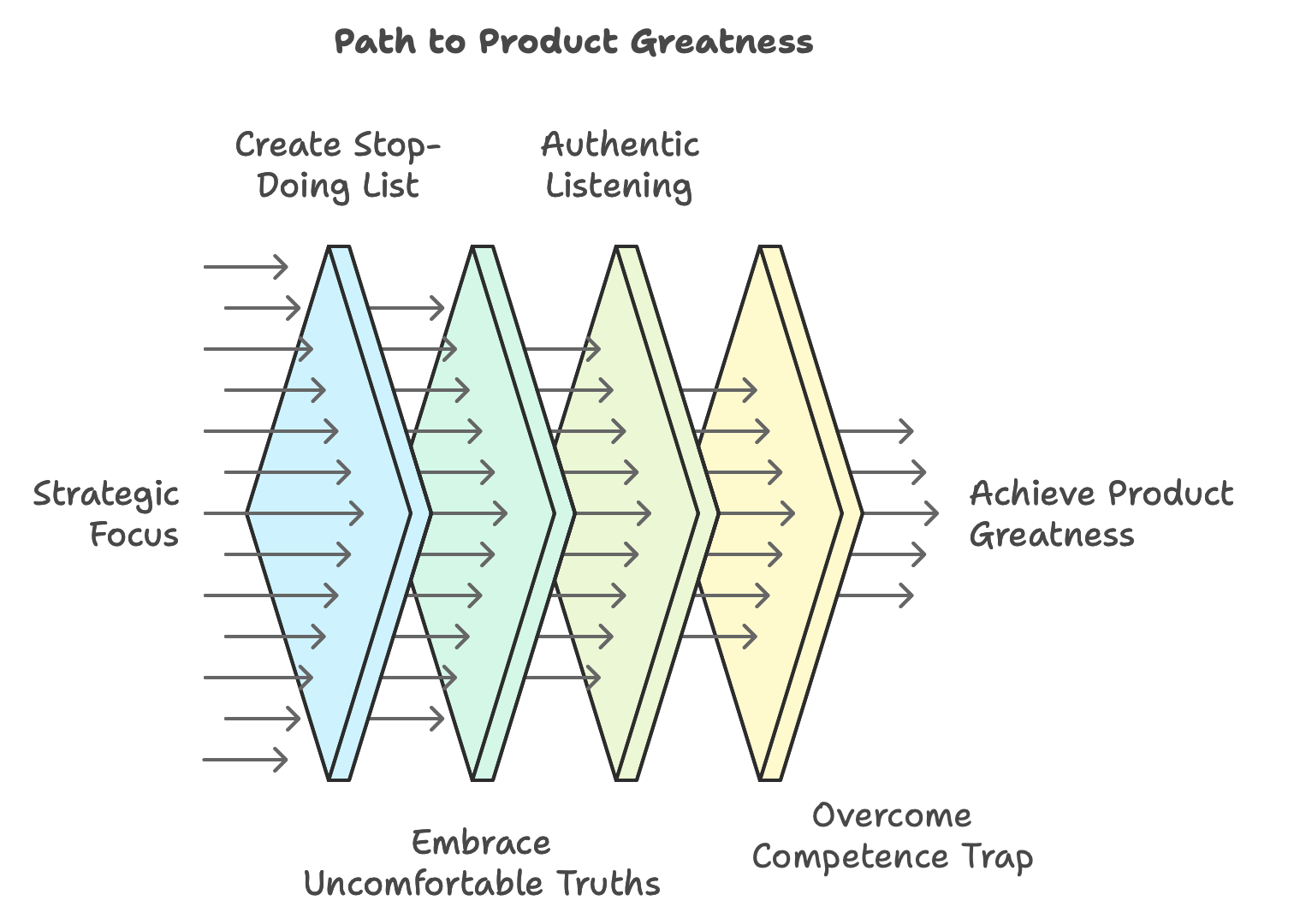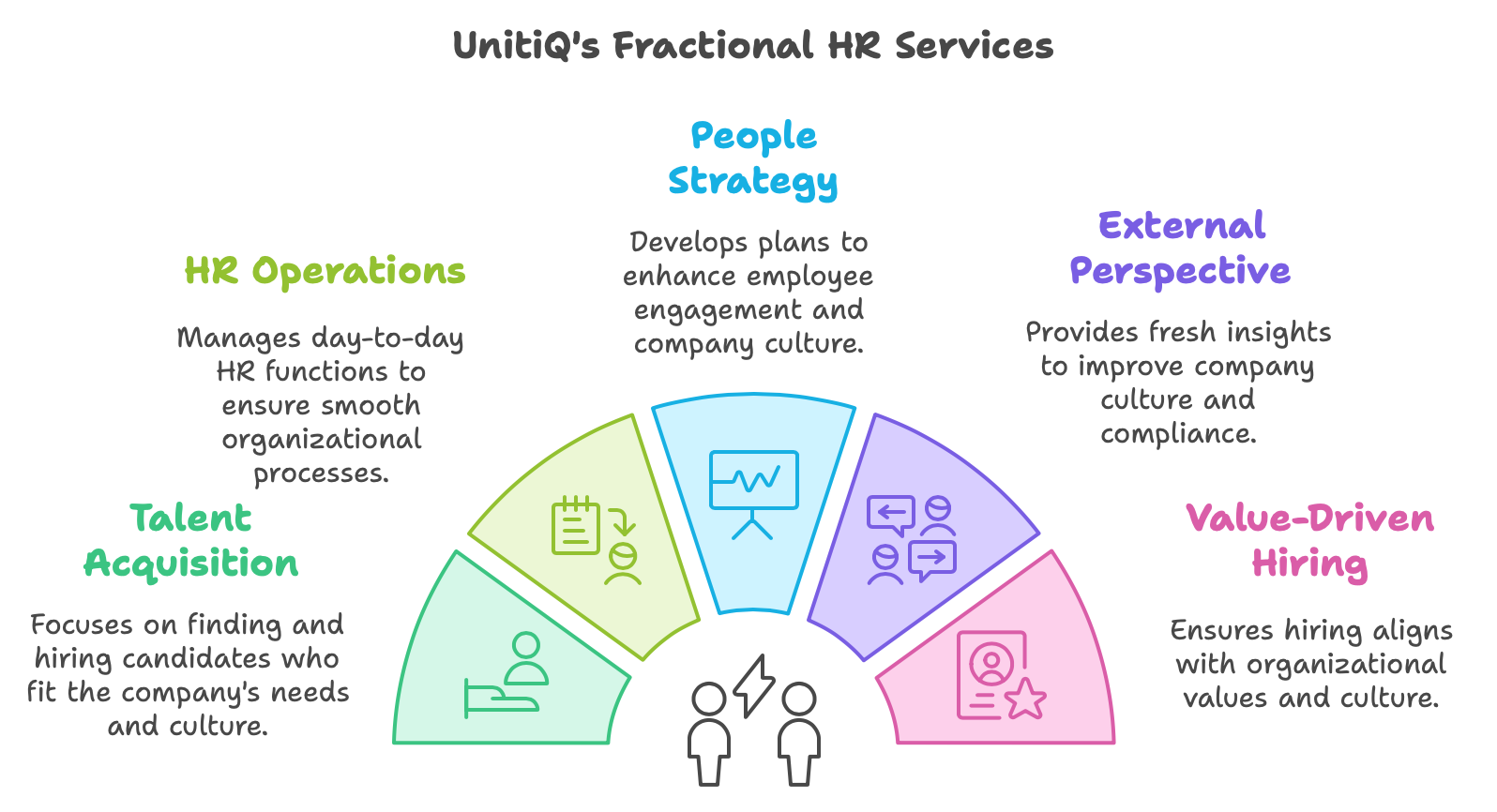In his exploration of leadership, Jim Collins dives deeply into the qualities that transform a company from good to great. Through rigorous research, Collins offers insights into two major areas: team-building and product excellence, crafting observations that act as guiding principles for leaders.
His work is rooted in years of studying successful companies, analyzing thousands of articles, and conducting countless interviews. Let’s unpack Collins' approach to team management and the development of remarkable products, drawing from his wisdom and adding a few modern considerations.
His work is rooted in years of studying successful companies, analyzing thousands of articles, and conducting countless interviews. Let’s unpack Collins' approach to team management and the development of remarkable products, drawing from his wisdom and adding a few modern considerations.
About Jim Collins
Jim Collins is an influential American business consultant, researcher, and author, renowned for his books like Good to Great, How the Mighty Fall, and Built to Last. His research process is incredibly methodical. For instance, in his study for Good to Great, Collins' team spent more than a decade dissecting the mechanics behind top-performing companies. They analyzed over 6,000 articles and crafted lengthy interview transcripts to decode the blueprint of greatness, attempting to answer one central question: How can a company go from being merely good to truly great? The answers, as Collins notes, are universal principles that any organization can apply.
Insights on Building and Leading a Great Team
A recurring theme in Collins' work is the importance of the right people. He challenges the common belief that "people are everything," arguing instead that having the right people is everything.
Collins encourages companies to prioritize rigorous hiring standards over rapid expansion. This principle aligns with what he calls "Packard’s Law," named after HP co-founder David Packard, which states that a company should grow its workforce only as quickly as it can hire the right people. If a business grows faster than its hiring capabilities, it risks losing direction and quality.
Collins encourages companies to prioritize rigorous hiring standards over rapid expansion. This principle aligns with what he calls "Packard’s Law," named after HP co-founder David Packard, which states that a company should grow its workforce only as quickly as it can hire the right people. If a business grows faster than its hiring capabilities, it risks losing direction and quality.
Collins also observes that leaders capable of steering a company toward greatness often possess a unique blend of humility and fierce professional resolve. Unlike the larger-than-life figures who dominate media headlines, these transformational leaders are quiet, introspective, and driven by a purpose beyond personal recognition.
They focus more on the team's and company's long-term success rather than their own spotlight. This counterintuitive trait is what Collins calls a "Level 5 Leader"—a concept he created to define leaders who prioritize company growth over ego.
They focus more on the team's and company's long-term success rather than their own spotlight. This counterintuitive trait is what Collins calls a "Level 5 Leader"—a concept he created to define leaders who prioritize company growth over ego.

In companies aiming for greatness, the compensation structure doesn’t necessarily dictate success either. Collins discovered that pay alone isn’t an effective motivator for getting the best out of employees. Instead, pay structures should be designed to attract and retain top talent, not to try to force commitment.
Great leaders understand that meaningful work, alignment with the company’s mission, and the chance to contribute to something larger are what truly drive people.
Another striking insight Collins shares is the notion of self-motivation within a team. He argues that strong teams don’t need constant external motivation; they already possess a high degree of self-drive. In practice, this means that if a team member requires intense, ongoing supervision to perform, they might not be the right fit.
This viewpoint challenges traditional management styles, suggesting that true leadership involves nurturing independence and aligning each team member’s work with the company’s most significant opportunities rather than its most pressing problems. This placement encourages innovation and a proactive mindset.
This viewpoint challenges traditional management styles, suggesting that true leadership involves nurturing independence and aligning each team member’s work with the company’s most significant opportunities rather than its most pressing problems. This placement encourages innovation and a proactive mindset.
The Journey to Outstanding Products
Moving to product strategy, Collins emphasizes the importance of knowing what not to pursue as much as understanding what’s worth pursuing. He suggests leaders create a "stop-doing list" alongside their to-do lists. This is to help companies focus on activities that bring the most value and discard those that are simply consuming resources without long-term benefits.

Collins compares the launch of an exceptional product to the moment a chick breaks free from its egg—although it may appear like an overnight success, the reality involves a long period of gradual growth and development before that breakthrough moment. He underscores that innovation isn't a flashy, immediate transformation; it's often the result of consistent, disciplined effort that eventually yields visible results.
In his observations of companies like Pitney Bowes, Collins highlights how great companies focus intensely on uncomfortable truths and future threats instead of basking in past successes. Leaders of great companies structure meetings not as celebrations of achievements but as platforms for discussing the most critical obstacles ahead. This approach ensures that the team remains vigilant and forward-focused.
Collins also underscores the importance of genuinely listening to team members rather than merely giving them a chance to voice their opinions.
Great leaders understand that authentic listening means acknowledging and acting on insights from their team, creating a culture where everyone feels valued and heard. This openness fosters innovation and a sense of ownership within the company, leading to better products and, ultimately, better performance.
Great leaders understand that authentic listening means acknowledging and acting on insights from their team, creating a culture where everyone feels valued and heard. This openness fosters innovation and a sense of ownership within the company, leading to better products and, ultimately, better performance.

Another of Collins' core messages is the challenge of overcoming "the curse of competence." Many organizations fall into the trap of being good at something but never achieving greatness because they stick to their competencies rather than striving to do what they could potentially be the best at. Collins believes that true greatness comes when a company is bold enough to pivot away from what it merely does well to focus on what it can do better than any other.
Thoughts on Collins’ Perspective
Jim Collins’ observations offer a roadmap that’s both inspirational and practical. His insights about humility in leadership and the necessity of a self-driven team resonate strongly in today’s business environment. Particularly in the age of startups, where companies can become successful overnight, Collins’ advice reminds us that sustained greatness requires a deeper level of introspection and rigor.
I appreciate his emphasis on the "stop-doing list," as many companies—and individuals—tend to spread themselves thin, diluting their effectiveness. It’s refreshing to see a strategic perspective that values patience, self-discipline, and a commitment to long-term success over quick wins.
I appreciate his emphasis on the "stop-doing list," as many companies—and individuals—tend to spread themselves thin, diluting their effectiveness. It’s refreshing to see a strategic perspective that values patience, self-discipline, and a commitment to long-term success over quick wins.
Ultimately, Collins’ work isn't just about making companies great but about inspiring leaders to create workplaces that value integrity, sustained effort, and meaningful work. His principles encourage companies to be more than just profitable—they aim for impact and legacy.
Hiring the Right People: UnitiQ Principles
In Collins' words, greatness begins with getting the right people on the bus. He emphasizes that it’s not just about filling seats—it’s about finding people who genuinely fit your organization’s values, culture, and vision. UnitiQ’s approach aligns perfectly with this philosophy.
We don’t just look for candidates with the right skills on paper; they prioritize finding people who match a company’s values and long-term goals. This is crucial because when your team members believe in the company’s mission, they bring a deeper level of commitment, drive, and resilience.
We don’t just look for candidates with the right skills on paper; they prioritize finding people who match a company’s values and long-term goals. This is crucial because when your team members believe in the company’s mission, they bring a deeper level of commitment, drive, and resilience.

UnitiQ’s service model also allows businesses to maintain high standards in hiring without rushing the process. Our HR experts can step in to handle time-sensitive hiring needs while ensuring every candidate is a cultural fit.
Plus, we bring in sector-specific knowledge to ensure candidates aren’t just skilled, but truly capable of contributing to the company’s particular industry challenges and goals.
Hiring the right people is an investment in the company’s future, and UnitiQ’s flexible, on-demand model helps companies get there without compromising on quality or alignment.
We are happy to help you with Talent Acquisition and HR tasks, please contact me, Olga Fedoseeva, Founder at UnitiQ, directly:
My Telegram
My LinkedIn
